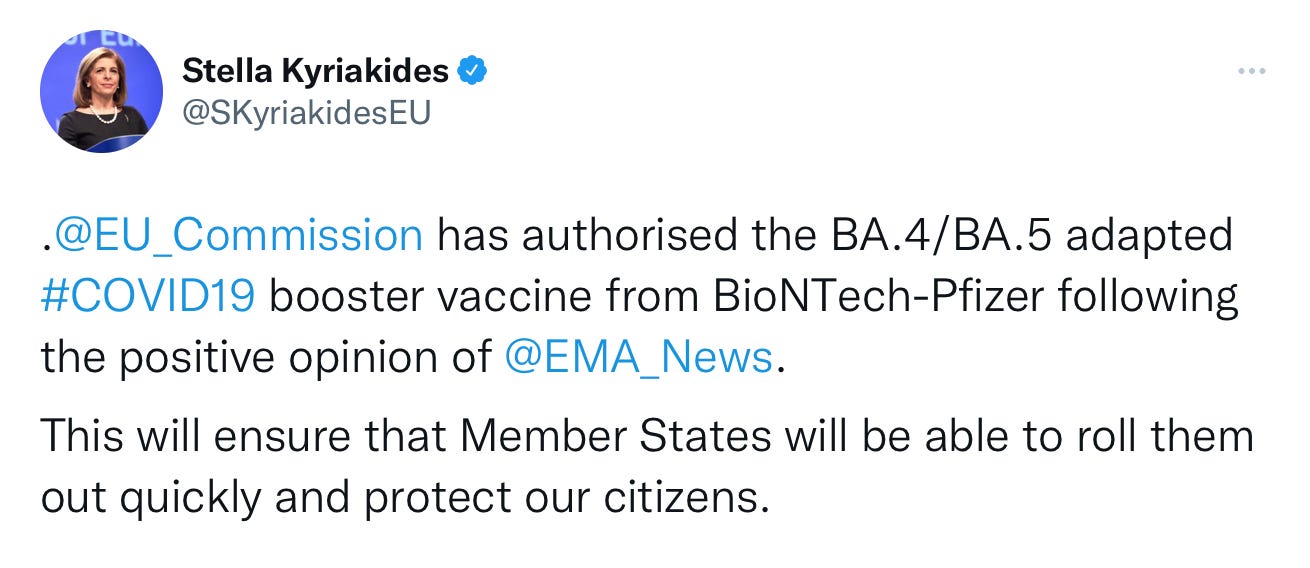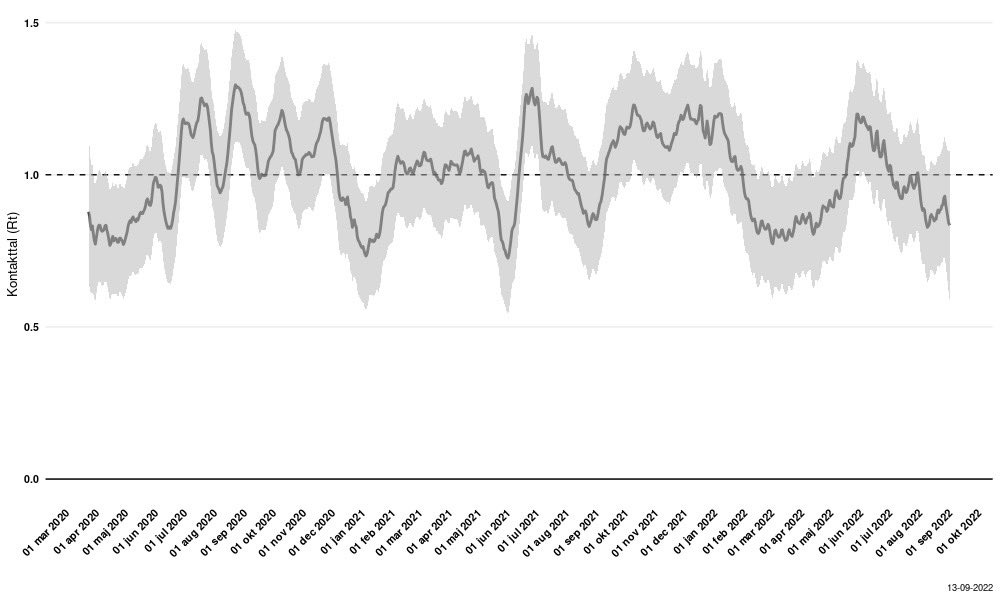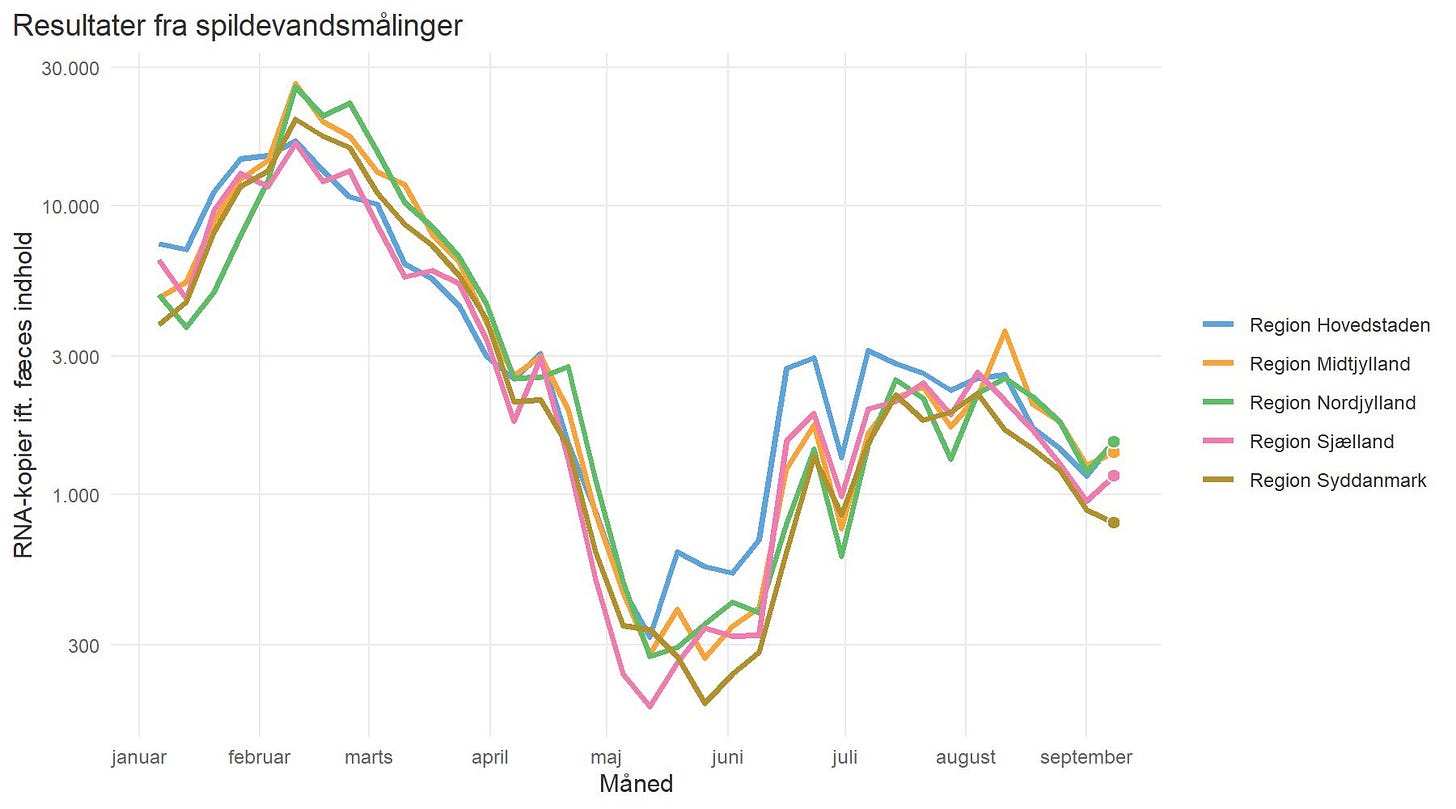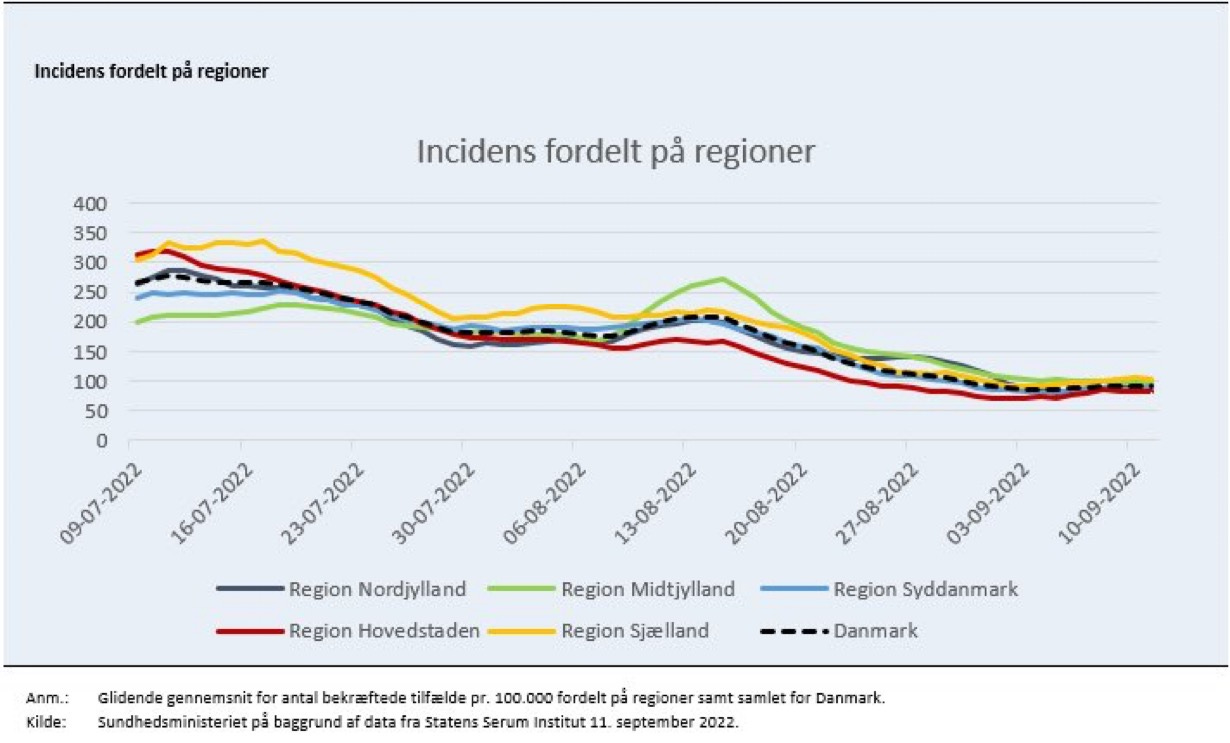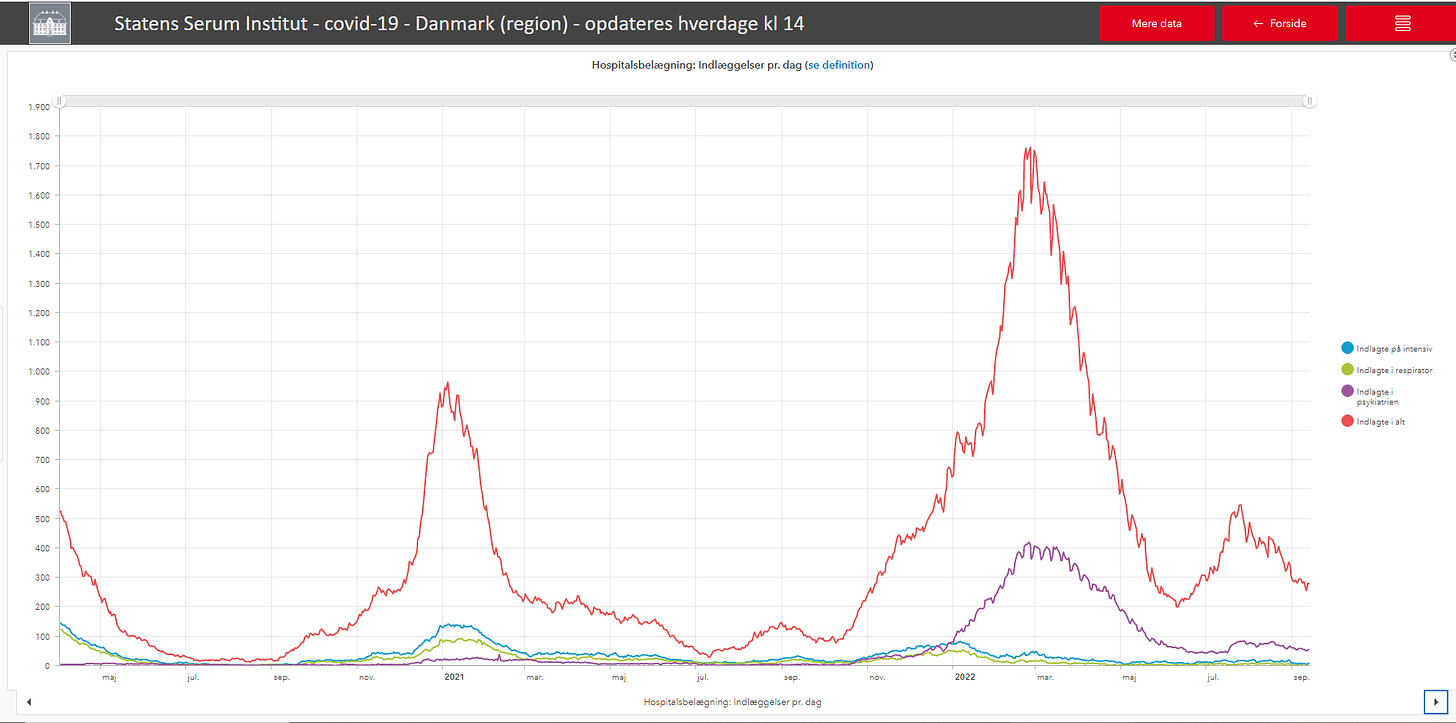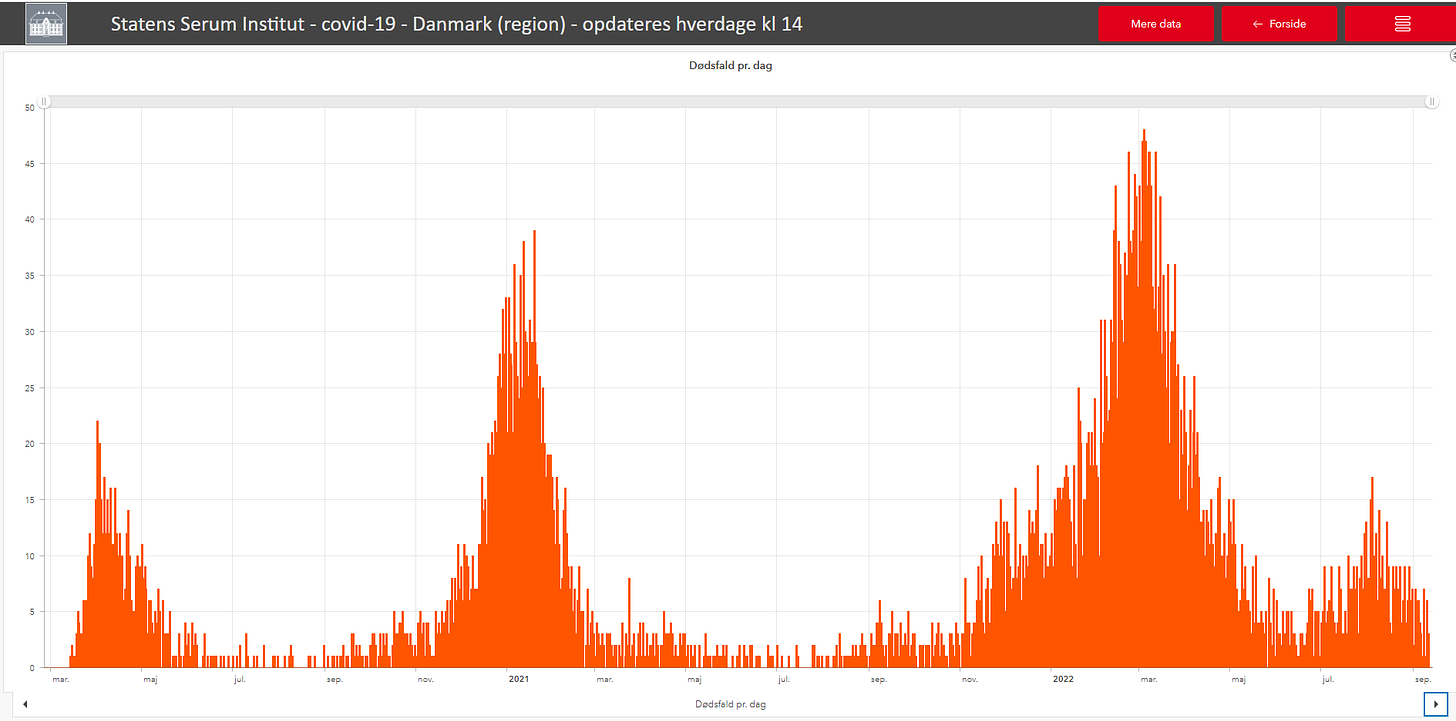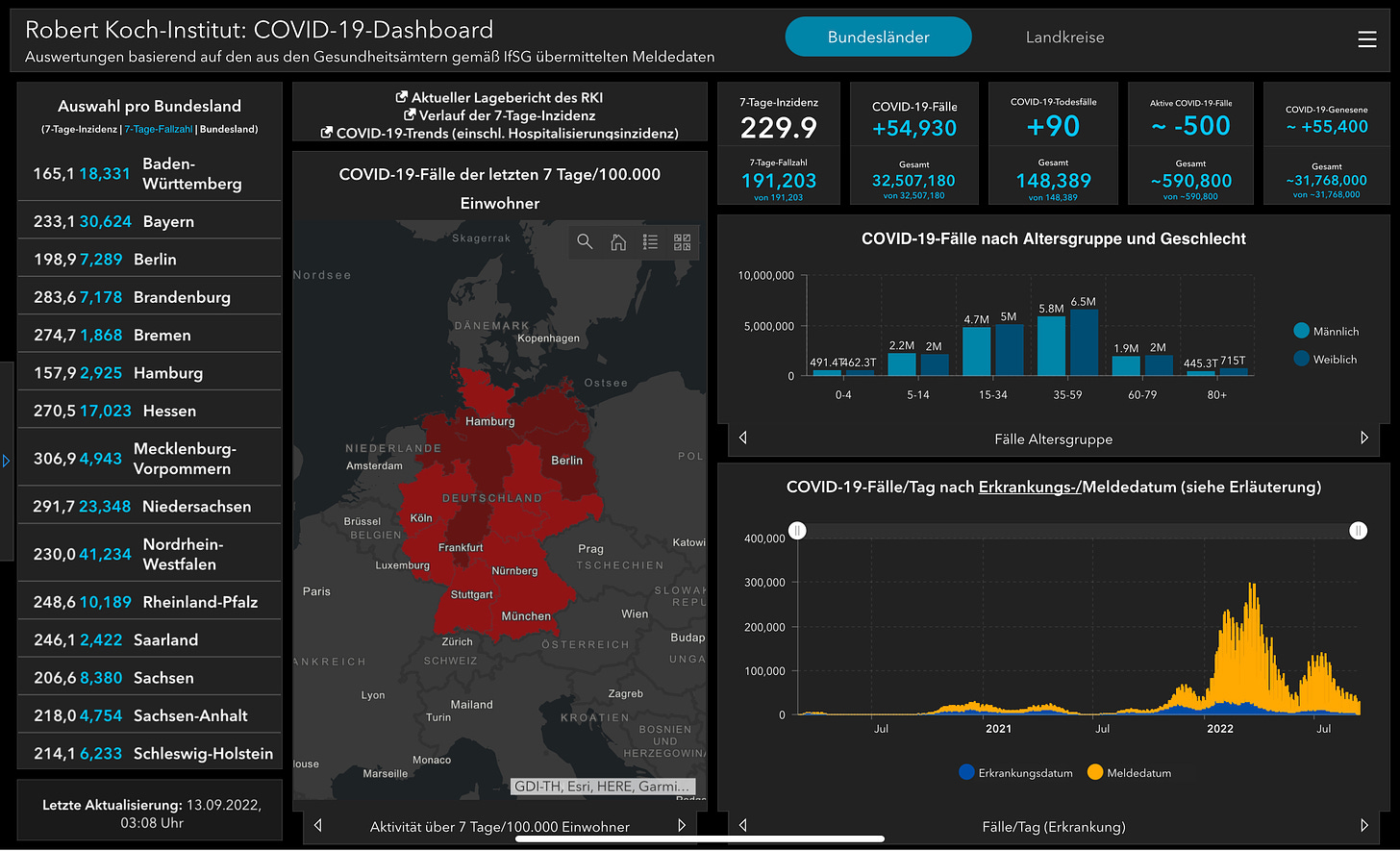The Evening Report - Sept 13
Another bivalent vaccine enters the fight. Mixed pandemic news in Denmark
🦠Pandemic🦠
🇪🇺💉
Fall booster dose campaigns across Europe will now have not one, but two bivalent vaccines to use. The European Medicines Agency has recommended the Pfizer/BioNTech bivalent vaccine targeting the BA.4 and BA.5 variants be approved for use in Europe. The EU Commission, which is responsible for making a final decision, did so in lightning speed on Wednesday, taking barely an hour to green-light the new vaccine formula for use across the European Union.
The EMA reviewed all the evidence and data on the new bivalent vaccine and came to the conclusion that it was as effective against the original coronavirus strain and even more effective against the two Omicron sub-variants than Pfizer’s initial mRNA formula. The agency says the bivalent vaccine not only prompted an improved immune response, it also has not resulted in any additional side effects.
The agency says on top of a host of data and independent studies available for review in making its recommendations, it is also keeping tabs on a number of ongoing studies.
Just last week, the first bivalent vaccine was approved for use in Europe. This one is designed to combat the original coronavirus strain and the first Omicron sub-variant, BA.1.
🇩🇰
The Danish National Health Board is urging people who have been invited to get vaccinated to get the shot right away. With a second bivalent vaccine now approved in Europe, the agency is clearly concerned people may wait for a booster dose targeting the dominant BA.5 and BA.4 variants. At the moment, Danish vaccination sites have about 750,000 doses of the first bivalent vaccine, but not yet any of the second.
Deputy Director Helene Bilsted Probst says both the updated variant-specific vaccine will offer more robust protection against the coronavirus.
“We now have several variant-updated vaccines, which we expect to provide both broader and better protection against severe infections and death. We expect the BA4/BA5 updated vaccine to provide at least as good protection as the already approved BA1 updated vaccine, and it may even be slightly better. Everyone who needs to be vaccinated in the autumn vaccination program will be vaccinated with a variant-updated vaccine, and we will continuously assess how we can best use the ones we have.”
Probst is stressing that people shouldn’t pick and choose which bivalent vaccine they want and rather should get the one offered as fast as possible.
“Timing is absolutely crucial in terms of avoiding severe infection, so we have to start the vaccination program now, so that we get ahead of the infection wave. The first invitations have been sent out, so make an appointment for vaccinations when you are offered it. That is the most important thing right now in terms of protecting those who are at risk of severe infections.”
The health authority says it will announce “in the near future” how the latest bivalent vaccine doses will be used.
-
For a second straight week, Denmark’s COVID contact number, or reinfection rate, or R0, remains at 0.8.
Health Minister Magnus Heunicke says that wastewater surveillance shows that coronavirus activity is now “slightly increasing” in four of the five Danish regions, although he adds it is “at a low level”.
Heunicke says the COVID incidence rate as measured by the results of PCR testing, which is very low, shows a “stagnation of the infection” across all five regions.
The health minister says pandemic-related hospitalizations also have stagnated week to week. Among the vulnerable population of seniors in care, the number of confirmed infections more than doubled from 53 to 102 from week 35 to 36.
The booster dose vaccination campaign begins on Thursday in Denmark, with seniors in care and all seniors 85 years old and older getting a first crack at a 4th dose.
-
COVID hospitalizations (278) have dipped slightly (-2) while the number of severe infections needing intensive care (9) crept upward (+3) of those, the number on a ventilator remained at zero. Infection admissions to a psychiatric facility (55) crept up (+1).
-
Denmark is reporting 990 infections (underreported), including 271 reinfections, and one more coronavirus death over the last day.
With 8,046 PCR tests taken yesterday that equals a positivity percentage of 12.30%, over seven days, the rate is 13.92%.
-
Region Syddanmark says invitations have been sent out to begin the fall vaccination effort. The region says they are looking to kill several birds with one stone by piggy backing flu shots and vaccination against pneumococci on top of the COVID booster effort. It is also encouraging anyone who has yet to be vaccinated to take advantage and get their shots during this latest inoculation campaign.
CEO Kurt Espersen:
“This year, the vast majority of southern Danes have been vaccinated against COVID, and immunity in society is high. This year it is about protecting the elderly and the vulnerable with a booster dose, so that their risk of a severe infection is reduced. In addition, we also offer southern Danes over the age of 65 and other target groups vaccination against influenza and pneumococcal disease. I would encourage everyone who is invited to accept the invitation.”
Beginning Thursday, seniors in care, elderly seniors 85 years old and older, and people in high-risk and vulnerable populations will be able to get a 4th dose. Then, on October 1, the booster dose campaign opens up to include anyone 50 years old and older.
🇸🇪
The Swedish Public Health Agency updates its COVID statistics once a week every Thursday.
-
COVID hospitalizations are creeping up again in Sweden’s capital region. There are 259 infected people in hospitals in Region Stockholm, an increase of 38 from a week ago.
There is still about a 50/50 split between infected patients who need hospital care directly because of an infection and those being admitted for a non-pandemic reason but who are also infected. In either case, caring for infected patients is a resource-heavy task. There are just two people in an ICU in the region.
Chief Physician Johan Bratt:
“Once again, the number of COVID patients who need hospital care is increasing. It is a worrying increase when the healthcare system is now trying to catch up as much as possible on all the procedures postponed during the pandemic. To reduce the risk of the spread of infection, it is important that you stay at home and see as few people as possible if you have symptoms. And that you get vaccinated so that you get good protection against severe infection.”
The region recorded another 1,035 confirmed infections in the last seven days, a number very underreported. It also suffered another 12 pandemic deaths. Of those, three were seniors in care. Again, it is worth noting that Sweden continues to struggle with a backlog of reporting coronavirus deaths.
🇸🇪/ 🇺🇦
Sweden is donating half a million Pfizer/BioNTech vaccine doses to Ukraine as cases flare up there. The Ukrainian Ministry of Health reports that infection numbers are rising, with 23,864 COVID cases recorded since September 5. The donated doses appear to be the new bivalent vaccine but the Swedish government doesn’t specify, simply describing them as “new, updated vaccine”.
Swedish authorities add that even with donating 500,000 vaccine doses to Ukraine “there is enough of the updated vaccine to cover the needs of the entire adult population in Sweden”.
Ukraine has very low vaccination rates with roughly 36% of its population having received just one dose.
🇳🇴
The Norwegian Institute of Public Health is expanding eligibility for a 4th vaccine dose to everyone 12 to 64 years old who is considered high-risk or is vulnerable due to battling an underlying health condition. The booster dose has already been offered to seniors 65 years old and older.
Infection Control Director Trygve Ottersen:
“This is good news, and means that people who have an underlying risk of a serious COVID infection will also be offered a new booster dose in the coming weeks.”
-
The NIPH says the first batch of bivalent vaccines from Pfizer/BioNTech targeting the original virus and the BA.1 Omicron variant is being distributed to municipalities for vaccinations. Another bivalent vaccine from Moderna is due to arrive in a few weeks to further bolster inoculation efforts.
Trygve Ottersen:
“We expect that the updated vaccines will provide better protection against becoming infected and having mild symptoms, while protection against serious disease will be good regardless of which vaccine is taken.”
Ottersen says it will “still be some time” before the new bivalent vaccine approved for use in Europe this week arrives in Norway for use. This is the one that targets the BA.4 and BA.5 variants.
“Our clear advice is that people now accept the vaccine they are offered because it is important to strengthen protection against severe infection.”
🇫🇮
The Finnish Institute for Health updates its COVID numbers once a week every Thursday.
-
Finland is seeing a surge in enterovirus cases. The Finnish Institute for Health says most of the people infected have experienced mild symptoms but there have also been cases of young children who have been infected and experienced shortness of breath and pneumonia.
The institute says there were 243 cases all of last year but 217 cases have already been confirmed this year and the agency says those numbers are expected to increase.
Children are usually most susceptible to enterovirus infections, but it can also infect young people and adults. Infections are usually mild and clear up in a few weeks. The virus usually results in respiratory symptoms, stomach issues, and in rare cases myocarditis (swelling of the heart muscle) and meningitis.
The virus can be transmitted from feces to hands and then to the mouth or by air droplets. The best way to avoid infection is good hand-washing.
🇩🇪
Germany registered 54,930 infections and suffered 90 more pandemic deaths since its Wednesday update.
It added 1,426 hospitalizations, while ICU numbers (691) edged upward (+18). As a percentage of all ICU beds in the country, 3.2% are being used by coronavirus patients.
On the vaccination front, 77.9% of the total population have had one dose, 76.3% have two, and 62.1% have a booster shot.
WHO🦠
17 million cases of long-COVID. Modeling from the the World Health Organization and the University of Washington’s Institute of Metrics estimates, that is, how many people have suffered from long-COVID in Europe alone in the last two years of the pandemic. The modeling also indicates a mind-numbing 307% increase in long-COVID cases from 2020 to 2021 due to a tidal wave of infections due to new stronger variants. The data also points to the risk of long-COVID increasing dramatically among people battling severe infections. Roughly one out of three women who become infected end up battling residual coronavirus symptoms for months after recovery; for men it is one in five.
WHO Regional Director Hans Kluge:
“While there is much we still need to learn about long COVID, especially how it presents in vaccinated versus unvaccinated populations and how it impacts reinfections, this data highlights the urgent need for more analysis, more investment, more support, and more solidarity with those who experience this condition. Millions of people in our Region, straddling Europe and Central Asia, are suffering debilitating symptoms many months after their initial COVID-19 infection. They cannot continue to suffer in silence. Governments and health partners must collaborate to find solutions based on research and evidence.”
Kluge says if you expand the modeling to make it global, the number of estimated long-COVID cases increases to a shocking 145 million people.
IHME Director Dr. Christopher Murray says afflicted people struggle with a number of debilitating symptoms.
“Fatigue with bodily pain and mood swings, cognitive problems, and shortness of breath. Fast-forward to today and millions of people continue to suffer because of COVID-19’s lingering impact on their health and livelihoods. Knowing how many people are affected and for how long is important for health systems and government agencies to develop rehabilitative and support services. It’s also paramount for employers to understand, so that special accommodations can be made to help those facing limitations.”
WHO Europe has formed an official partnership with Long COVID Europe, an organization that includes 19 patient associations across Europe. The partnership is calling on governments and health authorities to recognize long-COVID is a serious problem, prioritize treatment, and patient care. It promotes a three-pronged approach, knowledge sharing, research and data gathering, and rehabilitation.
🇳🇿
As its Omicron variant-driven infection wave begins to ease, New Zealand is relaxing a number of its tougher COVID restrictions. The country has had some of the strictest coronavirus restrictions of any country on earth. Now, it is lifting mask mandates in grocery stores, on public transit, and on airplanes. However, people will still have to mask up in hospitals and senior care homes. As well, the vaccination mandate for healthcare workers is also being lifted and tourists will no longer have to present proof of vaccination to enter the country. One restriction still remains in place; anyone testing positive must still be quarantined for seven days.
✈️ 🦠
Cheap airfares are a thing of the pre-pandemic past and will not be making a return. That is the assessment of Lufthansa’s Director, Carsten Spohr, who was speaking to Reuters. He says the budget airfares of the past were too cheap and just irresponsible, and that the pandemic driving airfares up was actually a good thing for the airline industry. Spohr added that he thinks prices will remain at about where they are now or rise even further.
🇨🇦
The Public Health Agency of Canada only updates its pandemic statistics once a week every Friday.
⚡️Energy Crisis⚡️
🇪🇺
European Union politicians are giving themselves some more time to negotiate among member states on how the EU will tackle the energy crisis. An extraordinary meeting of the Energy Council has been called for September 30 to hammer out the final details of the energy package.
On the table right now is a proposal for a 10% cut to overall power demand; 5% mandatory reduction during peak periods. A 33% levy on profits being collected by energy giants, and a cap on revenue for renewables and nuclear operators. A possible cap on the price of imported fuel is also being floated.
🇩🇰
December is usually a wonderful month to be in Denmark as the country goes all in on celebrating Christmas all month long. Cheery Christmas markets, lots of seasonal events, and bright festive lights at every turn, but it looks like the energy crisis is going to mean a darker December in Denmark this year. The country’s largest department store chain, Salling, has already announced it will forgo exterior Christmas lights on its buildings to conserve energy. Now, people living on Angolavej in Amager, a street famous for its over-the-top Christmas light displays, have decided to go dark this winter as well.
Henrik Petersen is one of the homeowners and he spoke to TV2:
“We are in a crisis. There are problems with the energy supply. And we will have to show that we also want to be able to do our part.”
The hope is the pause of the 20 year long tradition this year will be a one-off and that the street will be awash again in Christmas lights next year.
-
Copenhagen's Hotel d'Angleterre has also chosen to scrap this year’s exterior Christmas lights display.
The hotel’s Public Relations Manager Signe Thorup, spoke to Ritzau to say the energy crisis is to blame.
“It is of course a decision that was tough to make, but it is the right decision in the situation we are in.”
The hotel has had an eye catching Christmas lights display on its building in Kongens Nytorv since 1995.
🇫🇮/ 🇪🇺🇷🇺
Finnish Prime Minister Sanna Marin addressed the war in Ukraine and the energy crisis gripping Europe in a powerful speech delivered at the European Union Parliament on Thursday.
Marin took the EU to task for not being tough enough on Russia.
“[The EU]must confess we have adopted too naïve an attitude toward Russia and based our expectations on erroneous ideas. We should have listened to our Baltic and Polish friends who lived under Soviet rule."
Turning her attention to the energy crisis, Marin warned Russia is using its energy exports as a weapon to try and splinter the EU.
"If the EU is internally divided, it is weak and that it what Russia wants. This unity is especially important when Russia uses energy as a weapon. Blackmailing our societies through energy supplies is an attempt to erode European support for Ukraine and to break up our unity. Putin must not succeed in this. With its war, Russia is destroying its own economy and future. Our trust in Russia is gone, and even if the war ends today, that trust will not be restored for a long time.”
Marin warned that Europe is going to face even more challenges during the coming winter months.
"We must look after the availability of energy throughout Europe and also be ready for the introduction of extraordinary measures to reduce the price of energy.”
But she also reminded Europeans to keep the struggles we are facing and are about to face in context.
“While we count the price of war in euros, Ukrainians count the cost in human lives.”
🇺🇦/ 🇷🇺 War
🇺🇦
Ukraine is seeking to create what it calls the “Kyiv Security Treaty”. In a post on the website of the Ukrainian President’s office, the treaty is described as a way to unite Ukraine and states that will provide it with security guarantees. A core group of allied countries would commit to supporting Ukrainian Armed Forces, while others would provide non-military guarantees. The core group could consist of countries like the USA, Great Britain, Canada, Poland, Italy, Germany, France, Australia, Turkey, and others. President Andriy Yermak says the agreement would not be a substitute for Ukraine’s goal of joining NATO but rather a means of ensuring security against Russia until it can join the military alliance.
🇩🇰/ NATO
The Absalon-class Esbern Snare, one of Denmark’s two largest battleships, and its 240-person crew departed Frederikshavn port on Thursday. The warship will spend the next three months on high-alert patrolling the seas as part of a NATO marine deterrence effort.
First up are naval exercises off the coast of Portugal and then again in the English Channel before it begins patrols in the Baltic.
Ship Commander, Captain Lars Povl Jensen:
“When we enter the Baltic Sea, we must expect to be visited by Russian planes. This has also been the case in the past. We are of course ready to defend ourselves, but we are not on a mission to do anything to anyone. We are there to defend NATO.”
-
Russia’s invasion of Ukraine and continued efforts to use its energy exports as a weapon against Europe have caused Denmark to rethink its cyber security, especially for its energy sector.
Minister of Climate, Energy, and Supply Dan Jørgensen says a new cyber strategy is being created.
“We must be prepared to handle an increased cyber threat - including from Russia. The energy sector is the lifeblood of our society, so cyber security must be top notch.”
The new strategy will be driven by a ten-pronged approach to improving cyber security across the energy sector, including for suppliers who could be used as tools by hackers to sneak in to launch cyber-attacks.
🇸🇪/ 🇷🇺
Sweden has registered as an intervenor in two court cases against Russia over the war in Ukraine and violations of international law. The first case is a suit between Ukraine and Russia over allegations of genocide. It will be heard in the International Court of Justice in The Hague. The second, will be heard by the European Court of Human Rights in Strasbourg, where Russia is facing charges of serious violations of human rights during its illegal invasion of Ukraine.
Foreign Affairs Minister Ann Linde:
“Accountability for crimes committed in connection with Russia’s aggression against Ukraine is a high priority for Sweden. Sweden has therefore chosen to participate in several of the court cases currently pending to hold Russia accountable.”




